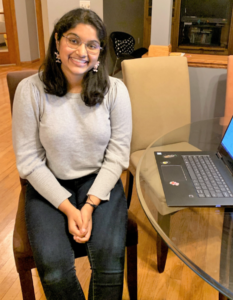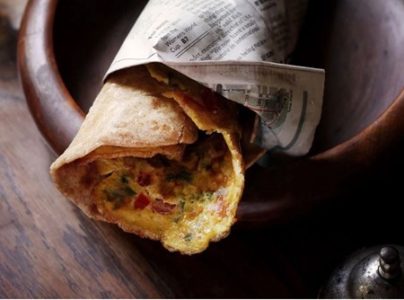Jan Low of the International Potato Center appeared at the 2020 World Food Prize in October. A past World Food Prize laureate, she spoke at a panel on biofortification, the topic for which she received her honor. At the end of the event, Low talked about the need for more research, especially for understanding market preference and promoting consumer demand.
Low is also a fierce champion for grooming young, aspiring scientists to pick up this torch and expand the work on biofortification, a viable solution for improving nutrition in the world’s most vulnerable communities.

Enter Sanjana Molleti, a recipient of a 2020 Borlaug-Raun internship at the International Potato Center (CIP). A sophomore Biology, Society and the Environment major at the University of Minnesota, Molleti applied for the fellowship after completing the Global Youth Institute (GYI), a program hosted by the World Food Prize for exceptional high school students with interests in agriculture and food security issues.
Molleti says she was attracted agriculture as a field of study through her fascination with nutrition and its effects on the body. At GYI, she learned how food, food systems, nutrition and public health link together and how different cultures have different approaches to nutritional challenges.
“Nutrition combines social and natural science and I like that connection,” she says.
The internship is a serious endeavor, says Low. “I treat them like a staff member but with a lot of guidance along the way. I have high expectations and I want them to leave with a skill and to make a genuine contribution to our program.”
While Low has mentored men and women in research, she understands the importance of working with young people like Molleti: “There is still a need for female role models in agricultural research.”
Rolex is not a fancy watch
Rolex is a popular street food in Kampala, Uganda, sold on nearly every street corner. It starts with an egg omelet containing spoonfuls of chopped onions, tomatoes and cabbage. The omelet is then rolled up in a flat bread called chapati. The chapati is made of 100% wheat flour. With a nice blend of seasoning, it’s a convenient and filling snack on your way to work or for after school.

For the past 15 years, Low and her team have been researching ways to bring more biofortified orange-fleshed sweetpotatoes (OFSP) into the diets of people in sub-Saharan Africa. Just 125 grams of OFSP can provide a day’s supply of vitamin A, which is especially important for young children and expectant mothers.
One successful venture in Africa has been the promotion of OFSP puree to be included in baked goods as a substitute for wheat flour. In Uganda, using this puree to make chapati for rolex would be an easy and effective intervention to improve the nutritional content of this popular food.
Beyond the benefits of vitamin A, OFSP puree would lower production costs of chapati, as it is less expensive the wheat flour. Most wheat flour in Uganda is imported, so using OFSP puree would create savings in foreign exchange and create a domestic market for Ugandan farmers who grow sweetpotato.
However, promoting successful adoption of OFSP puree requires a better understanding of the consumers – the people who eat Rolex and the people who don’t. And this is where Molleti is making her contribution.
“We think youth are the primary consumers of rolex, but we need a more specific understanding of this group? What motivates them to buy rolex? Do they think about nutrition when they purchase snacks? How much does price matters? If we understand these issues, we can design better plans for promoting the puree,” she explains.
Molleti’s charge has been to design five types of surveys for this research: available street foods; cost-revenue analysis; consumer preferences; non-consumer preference; and sweetpotato availability.
Quickly she is learning the demands of quality research as the team reviews and revises each survey.
“Right now, we are on version 23 of the cost-revenue survey. I have been over it so many times. And each time it gets better.”
Now the surveys have been finished and enumerators in Kampala are collecting data that Molleti and data management officer, Luca Wanjohi, record in a software program called ODK.
Initially, the internship would have included 8-9 weeks in Uganda working alongside Low and the research team but COVID-19 required adjustments to virtual work. Working from her home in Minnesota (USA), Molleti says the work has exceeded all her expectations.
“I started thinking my role would be small so I am thrilled that I have had such a hand in designing and collecting the surveys. I learned how to use a great data analysis program and I’ve been talking to lots of students in Uganda.”
Low is also pleased with Molleti’s contributions and the progress of the research. The COVID-19 pandemic has, in some ways, added to the learning process for her intern.
“She’s realizing there are so many more practical complications to research. Initially, we couldn’t collect data because it wasn’t safe for our enumerators to go out in the field. So, we had to wait and re-organize our process and that’s a valuable lesson about logistics.”
